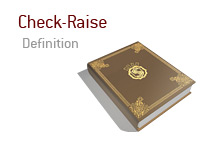Definition of Check-Raise
A check is essentially a pass or a null bet, and equivalent to calling the current bet, which is zero. A check is only possible when no non-check bet has been made. A player who checks has declined to place a bet, which is a technique used to avoid opening the hand.
If a bet has been made, the next player in line must fold, call or raise. When a player raises, he or she increases the size of the current bet, which forces all subsequent players to face a larger call.
 In poker, the check-raise is a deceptive action. The player checks in the hopes that another player will open. If another player does open, then the player performing the check-raise will raise when given the opportunity.
In poker, the check-raise is a deceptive action. The player checks in the hopes that another player will open. If another player does open, then the player performing the check-raise will raise when given the opportunity. A check-raise is useful, for instance, when a player would open with a very strong hand, such as pocket aces. The check-raise is effective because it alters perception of the hand, which puts the player into an advantageous position.
A check-raise fails when every other player checks, making the hand a free round. In that instance, it would have been better to place a bet in the hopes that at least one player at the table would've called it.
Check-raises are not always legal. Most casual games and small-stakes casino games disallow them. Some poker variants, such as California lowball, disallow check-raises by rule.
--
Recent Articles That Include The Term Check-Raise:
Can Anyone Beat Phil Hellmuth in The "High Stakes Duel"?
Viktor "Isildur1" Blom Wins SCOOP Main Event
Erik Seidel Wins 2011 National Heads-Up Poker Championship
Jeff Forrest Wins WPT Foxwoods World Poker Finals
High Stakes Poker Season 5, Episode 1 Summary
Back to the - Poker Dictionary

